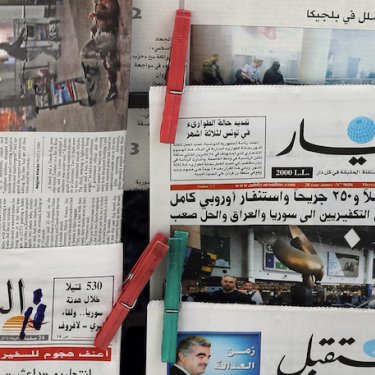Lebanese authorities less tolerant of media criticism

Reporters Without Borders (RSF) is concerned about an increase in judicial proceedings in Lebanon against media outlets critical of the authorities or their allies, including two recent or ongoing cases of journalists being prosecuted just for doing their job.
One concerns Marcel Ghanem, the host of a talk-show on Lebanon’s LBCI TV channel. Ghanem is more used to putting questions to his guests but on 2 February he will have to challenge the validity of the defamation proceedings against him, which could lead to a one-year jail sentence.
Ghanem is being prosecuted for allowing two Saudi journalists to express strong criticism of the Lebanese authorities during a broadcast of Kalam el Nas (“What they say”) last November and for then refusing respond to an initial summons for questioning.
“This clearly involves political pressure on the judicial system and attacks on freedom of expression before the coming elections,” he told RSF.
The other concerns Hanin Ghaddar, the former editor of the Lebanese English-language newspaper NOW, who was sentenced in absentia by a military court on 12 January to six months in prison for allegedly “defaming the Lebanese army” at a conference in Washington in 2014, when she said the army gave preferential treatment to the Shiite militant group Hezbollah.
“I am not the only journalist to shed light on Hezbollah’s activities in my articles but, as I am from a Shiite family, their resentment towards me is greater,” said Ghaddar, who plans to turn to international bodies to contest her conviction.
Ghaddar and NOW were previously prosecuted before a military court for publishing an interview with a political activist who said she had been raped and beaten in prison. The case was finally dropped.
“We condemn these disproportionate prosecutions,” RSF said. “Journalists should not be tried before military courts and should not be charged with defamation for comments made or obtained in the course of their journalistic activities, regardless of the political context. We stress the importance of pluralism for the proper functioning of a democratic society.”
According to Lebanese press freedom groups such as SKeyes, judicial proceedings against the media have increased since Michel Aoun’s election as president in late 2016, and have increased still more following Prime Minister Saad Hariri’s resignation (announced during a visit to Saudi Arabia and then withdrawn) and now in the run-up to parliamentary elections.
In the past year or so, Lebanon has seen a spate of insult or defamation proceedings against editorial writers, Twitter and Facebook users and even a humourist. In the latest case, the Lebanese daily Ad-Diyar was accused last weekend of insulting Saudi Arabia’s king. Its editor, Charles Ayoub, is facing a possible one-year jail sentence.
Lebanon is ranked 99th out of 180 countries in RSF's 2017 World Press Freedom Index.



